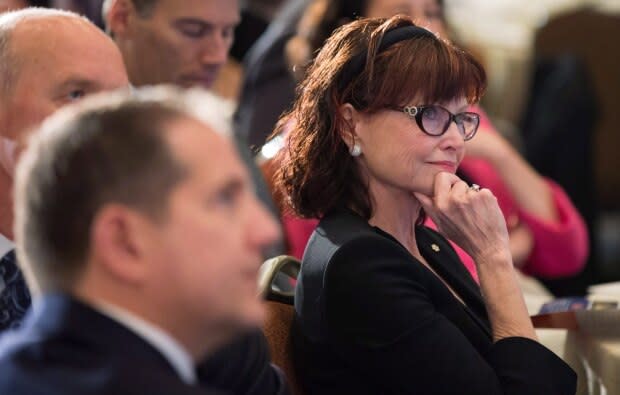How Hurricane Katrina played a key role in 2005 labour negotiations in B.C.
British Columbia is no stranger to simultaneous labour disputes, and no government is immune to their challenges. Rewind to 2005: Carole Taylor had just been named finance minister under Gordon Campbell's B.C. Liberal government.
Her first task as part of the new cabinet was a big one.
"I walked in as minister of finance [in June] and was immediately told, 'You're in charge of labour negotiations for 300,000 employees,'" Taylor told CBC on Friday.
It turned out that 90 per cent of B.C.'s public sector agreements were set to expire simultaneously at the end of the fiscal year.
"Teacher, doctors, nurses, CUPE — for some ridiculous reason, their contracts had all been set up to end on March 31 [2006]," Taylor recalled.
"That's an explosive situation; you can't close down a province."
Her experience with juggling all those contract talks seems especially relevant today.
The NDP government is currently handling a number of public-sector negotiations: Saanich school support staff are still on strike, Metro Vancouver transit workers are threatening further job action and contract talks with the teachers' union have broken down again.
Puppet master with the purse strings
Back in 2005, Taylor's appointment was the beginning of an exhaustive effort to get the unions on side.
Taylor knew she'd been given a tight financial mandate and, playing puppet master with the province's purse strings, she tossed conventional wisdom aside by showing all her cards right from the start.
"I was told by the professionals, 'No, no, no — you always start low and then move,'" she recalled. "But I said, 'Nope, we're going to be absolutely straight with the unions that this is the exact amount of money we have.'"
Barely two months into her strategy, Hurricane Katrina struck stateside — and with it, an eventual path out of the deadlocked negotiations.
The Category 5 storm shut down refineries up and down the U.S. Gulf Coast. It triggered a spike in natural gas prices. And it left B.C. with a sudden and unexpected $1 billion.
"It was a one-time shot of cash that I could suddenly use," said Taylor.
But she knew she couldn't use it for ongoing costs like wage increases.
"I happened to be a football fan and I understood signing bonuses." - Former B.C. Finance Minister Carole Taylor
That's when her love of sports kicked in.
"I happened to be a football fan and I understood signing bonuses," she said.
And so she came up with the idea of making an offer to the unions: "If you manage to settle before your contract runs out, then every single employee will get a signing bonus."
It worked out to about $4,000 per employee, but the unions were skeptical.
"At first they didn't believe me," said Taylor. "But once they talked it over with their lawyers, they realized that under the accounting rules, any money that's not spent by March 31 goes to pay off the debt."

It took time to convince the public, too, but in the end it was enough to move the negotiations in time to ink fresh deals before the end of the fiscal year.
"To make them understand it was an unusual, one-time cash inflow that we couldn't build into budgets going forward, that was a difficult public relations effort to try to make people believe, because the public often doesn't trust politicians," Taylor recalled.
Ultimately, the new contracts paved the way for labour peace leading into the 2010 Winter Olympics.
That came as a relief to no one more so than the woman credited with being the mastermind behind the negotiations.
"When we brought it to a successful conclusion, I'll tell you — we all slept better," Taylor said.

